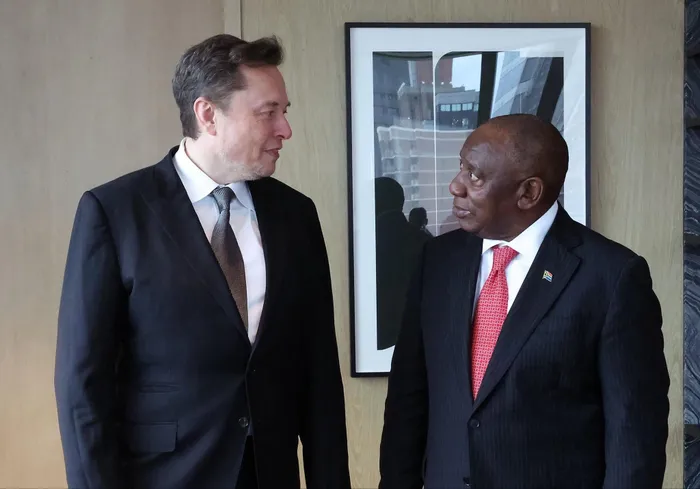Elon Musk's Starlink will have to wait for years – or find a way around B-BBEE laws ahead of G20
WIRELESS CONNECTIVITY CONFERENCE

President Cyril Ramaphosa denied harbouring ideas of relaxing economic transformation laws to benefit tech billionaire Elon Musk after his recent visit to the US. In his recent weekly letter to the nation, Ramaphosa reaffirmed South Africa’s commitment to broad-based economic policies that are central to fostering inclusive and sustainable economic growth.
Image: Presidency
Pretoria-born tech tycoon Elon Musk will have to wait for about two years before his Starlink satellite internet company can legally enter the South African market – a vital area for the service to operate optimally in the region.
Starlink – already available in a number of Southern African Development Community (SADC) and other countries on the continent – is reportedly aiming to launch its services in SA ahead of the G20 conference hosted by South Africa and opening in November. But the company still intends to bypass the Broad-Based Black Economic Empowerment (B-BBEE) law and its 30% previously disadvantaged individual ownership laws that Musk has labelled as “racist”, preferring instead to go the Equity Equivalent Investment Programme route, which on its own is not enough to be granted a licence.
“The wheels of government don’t mill that fast,” said Paul Colmer, an executive committee member of the Wireless Access Providers' Association (WAPA), a non-profit wireless industry association established in 2006.
Speaking to the Pretoria News on Wednesday about their 2025 WAPALOZA conference held in Muldersdrift near Johannesburg from June 23-25, Colmer estimated that it would take about two years for the Electronic Communications Act to be amended. He based this on a presentation by a legal practitioner who made a presentation at the conference.
He said as things stood, to “sidetrack” the B-BBEE requirements there would need to be a change in legislation, which is a “long process”.
There were other ways Starlink could speed up its entry into South Africa, including through partnering with local entities that already have the required B-BBEE status, but Musk and Starlink reportedly "really, really do not like the idea of middle-men". The company and its representatives have also been accused of using Musk's proximity to US President Donald Trump and members of his administration to expand across Africa and in other countries.
Colmer said Starlink, which has been “overhyped” when there were other similar service providers to choose from, was discussed at their conference but was not the main topic.
The key points of discussion included spectrum sharing – a major source of opportunities for the smaller local wireless internet service provider (WISP) following Icasa’s recent legislation amendment – and artificial intelligence (AI).
However, Colmer said his personal highlight was the technical presentations or regulatory discussions – it was the inspirational human stories of innovation and perseverance, especially that of Songezo Mhambi from the underserved Eastern Cape who spoke on "How I Built a WISP".
He said Mhambi started with network switches on his bed because the roof was leaking everywhere else, literally sleeping with his network equipment. He fought to get bank funding, overcame incredible hurdles, and now he's expanding and creating employment.
Today, Songezo is, among other things, founder and CEO at Mdaswifi, founder at Vice-Tech, a renowned tech entrepreneur and a “digital evangelist”.
Colmer said he wished he could clone Mhambi because people like him are the solution to getting everyone in South Africa connected.
A representative from the Independent Communications Authority of SA (Icasa) spoke about the connectivity ecosystem, emphasising how different forms of wireless technology can complement rather than simply compete with each other. Various connectivity solutions – from cellular to wi-fi to satellite – each have unique strengths and weaknesses that can together create a robust network ecosystem able to reliably and economically serve communities across South Africa’s diverse landscape.
Describing the conference as a success and welcoming the “pragmatic optimism” displayed, Colmer reiterated his view that Starlink was “overhyped” and dismissed concerns that Musk’s constellation was going to kill the smaller wireless connectivity operators.
In his conference summary he said: “Yes, Starlink is coming, but OneWeb is already legally available in South Africa. Amazon's Project Kuiper is on the way. The Chinese are building their own constellation.
“But here's what I think got lost in all the hype: Starlink isn't the WISP killer some people fear it is. It has real limitations – downloading certain apps is problematic, WhatsApp calling isn't ideal. It's going to be complementary rather than primary. In countries that initially moved from WISPs to Starlink, many have actually moved back to WISPs.”